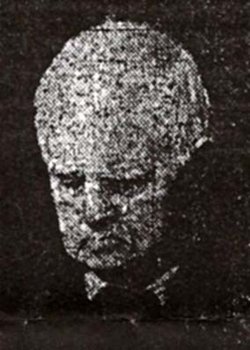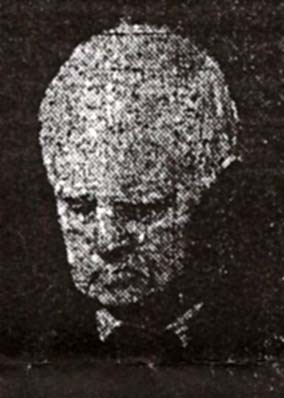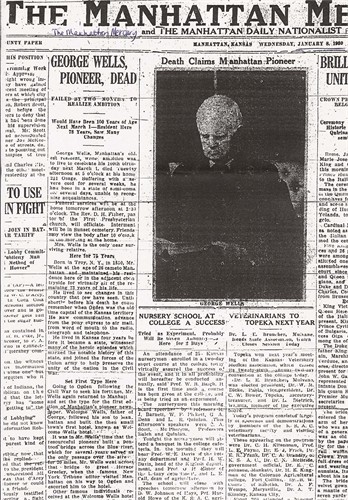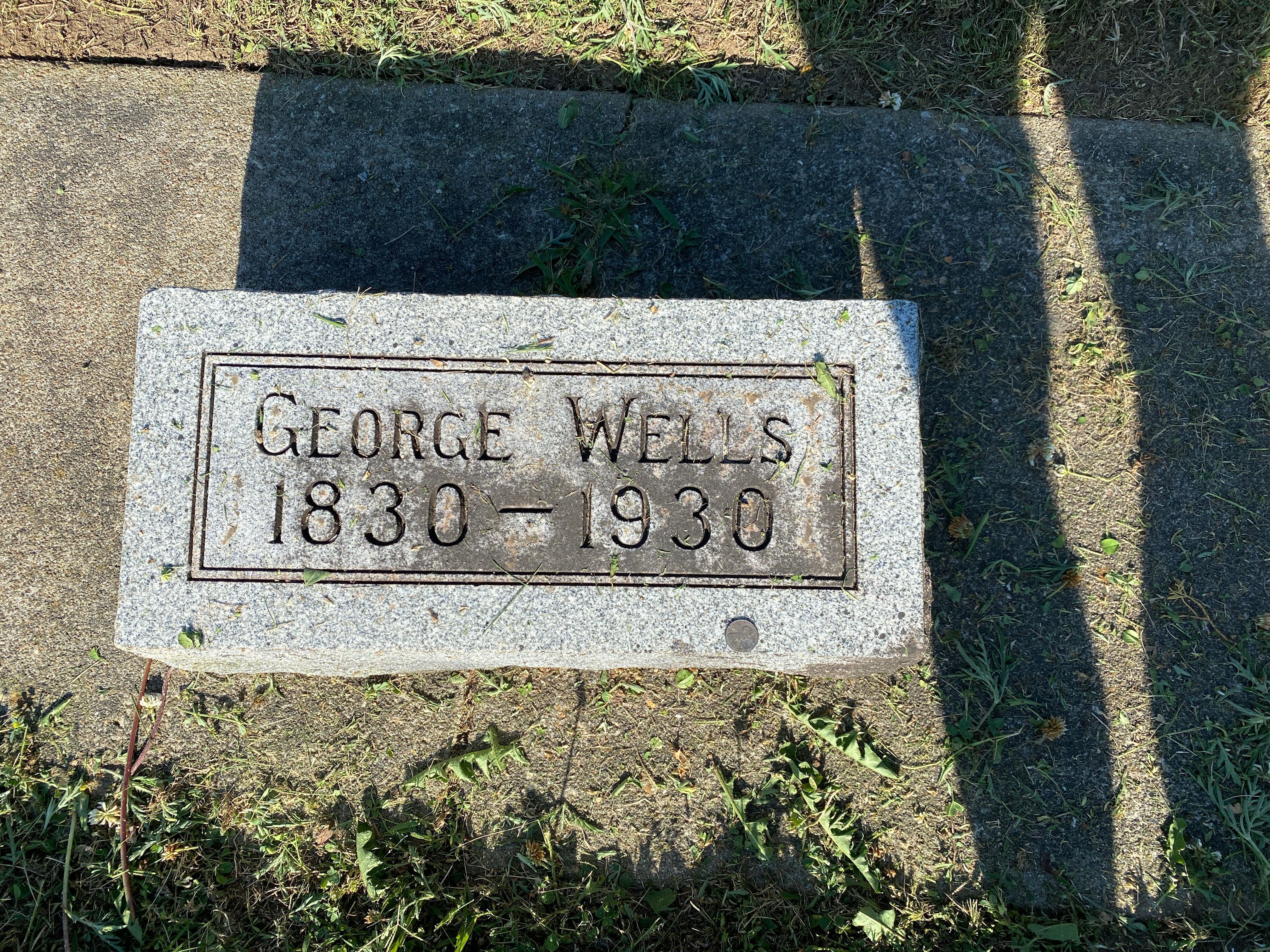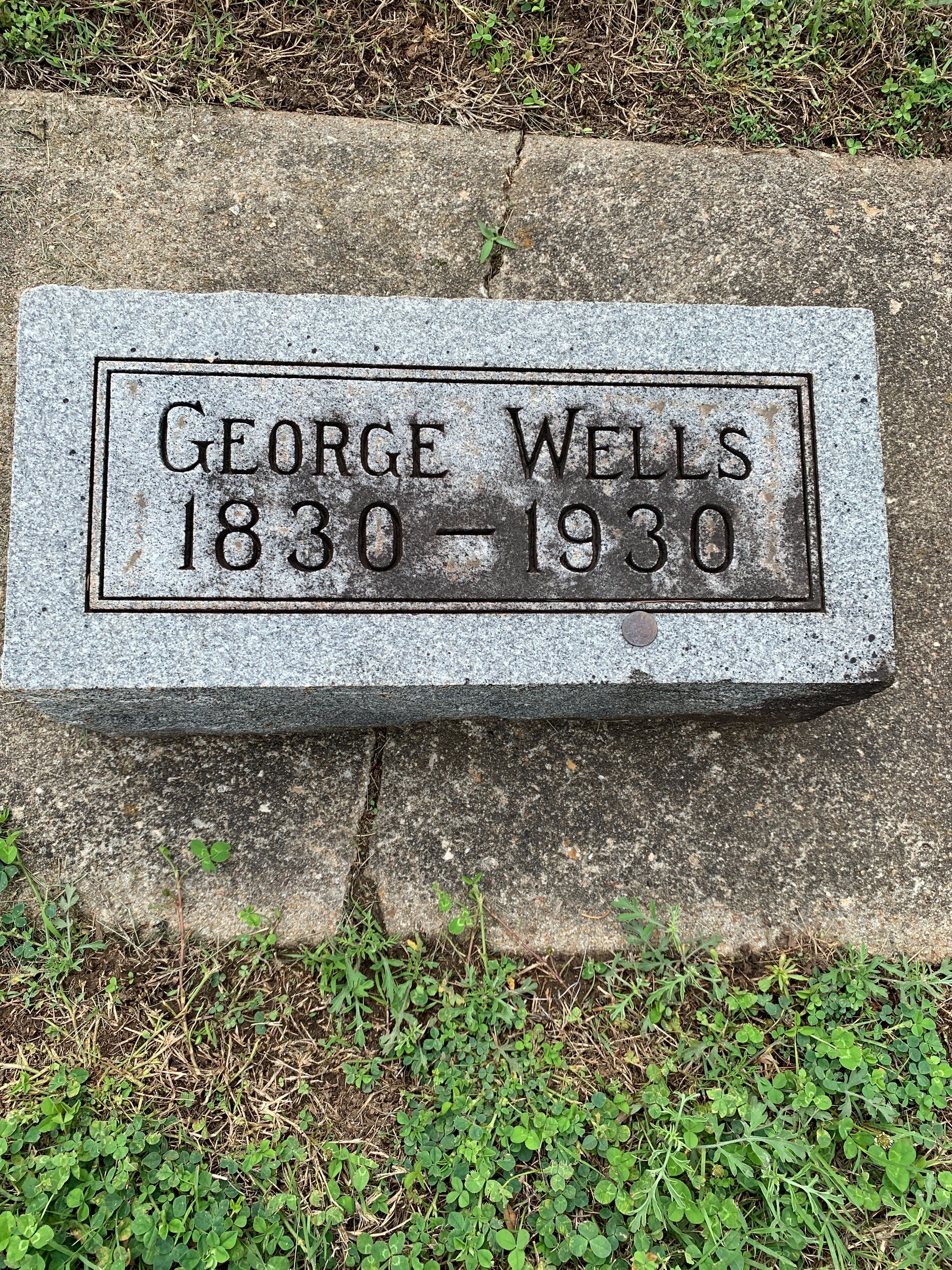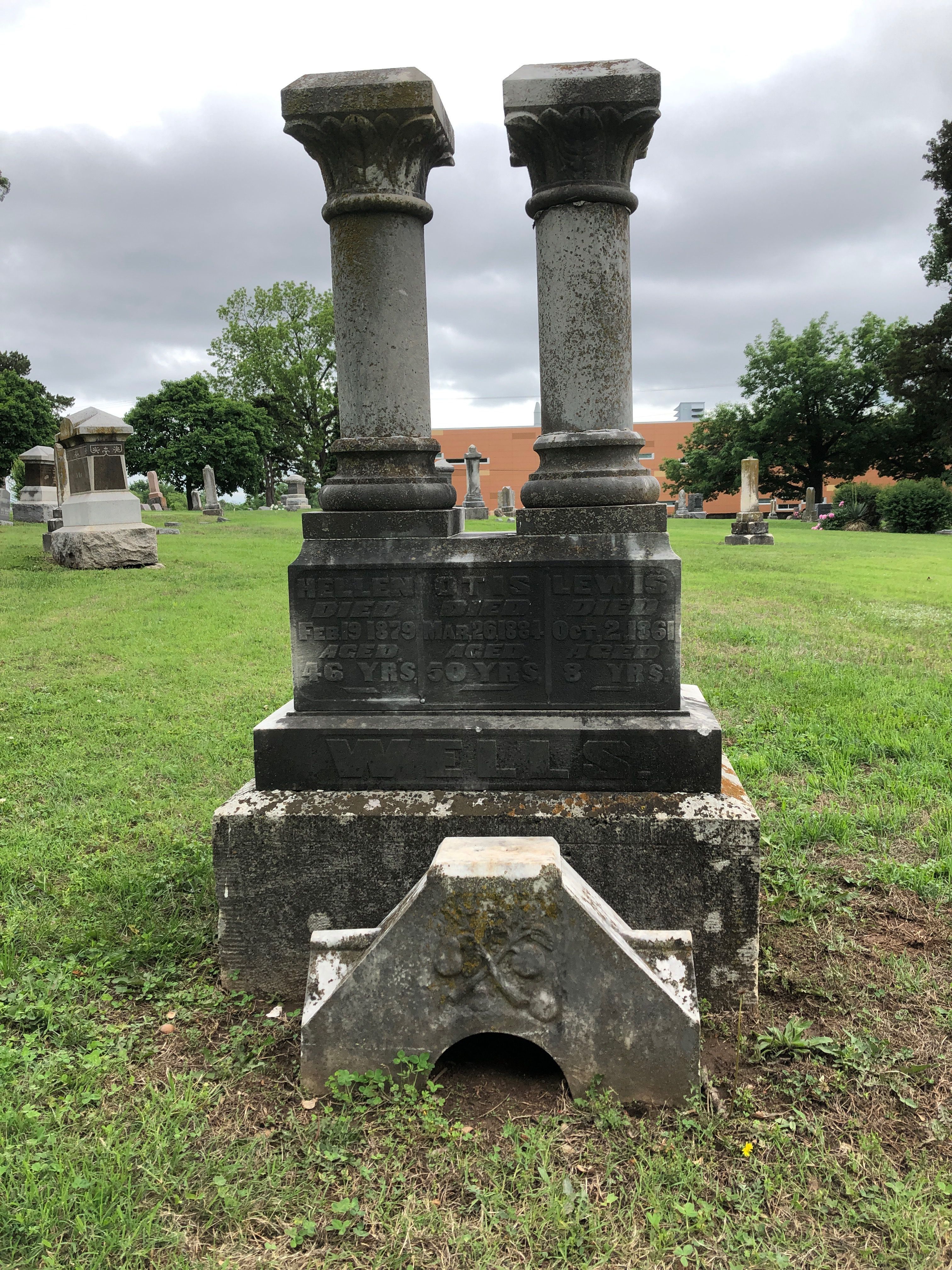GEORGE WELLS, PIONEER, DEAD
FAILED BY TWO MONTHS TO REALIZE AMBITION
Would Have Been 100 Years of Age Next March 1 -- Resident Here 73 Years, Saw Many Changes
George Wells, Manhattan's oldest resident, whose ambition was to live to celebrate his 100th birthday next March 1, died Tuesday afternoon at 5 o'clock at his home, 231 Osage. Suffering with a severe cold for several weeks, he had been in a state of semi-coma for several days, unable to recognize acquaintances.
Funeral services will be held at the home tomorrow afternoon at 2:30 o'clock. The Rev. D. H. Fisher, pastor of the First Presbyterian church, will officiate. interment will be in Sunset cemetery. Friends may view the body after 10 o'clock in the morning at the home.
Mrs. Wells is the only near surviving relative.
Here for 73 Years
Born in Troy, N. Y., in 1830, Mr. Wells at the age of 26 came to Manhattan and maintained his residence here or in the adjacent countryside for virtually all of the remaining 73 years of his life.
He lived to see changes in this country that few have seen. Until shortly before his death he could remember when Ogden was the old time capital of the Kansas territory. He saw communication advance from the pony express to air mail, from word of mouth to the radio, telegraph and telephone.
He lived in Kansas four years before it became a state, witnessed many of the heroic episodes which marked the notable history of this state, and joined the forces of the Union army to help preserve the unity of the nation in the Civil War.
Set First Type Here
Going to Ogden following the Civil War to seek his fortunes, Mr. Wells again returned to Manhattan and set the type for the first edition of Manhattan's pioneer newspaper. Welcome Wells, father of George, followed his son to Manhattan and built the then small town's first hotel, known as Welcome Wells hotel.
It was in Mr. Wells time that the resourceful pioneers built a pontoon bridge across the Blue river, which for several years served as the only passage over the stream for 20 miles. Mr. Wells went across that bridge to meet Horace Greeley, when the famous New York Tribune editor visited Manhattan on his way to Ogden and escorted him to the hotel.
Other famous individuals received at the Welcome Wells hotel included Susan Stone and Susan B. Anthony.
The Wells farm, three miles out of Manhattan, was regarded as the finest in the countryside, according to Mr. Wells. It was known as Cedar Grove, for the reason that a great grove of cedar trees grew there, and had a huge orchard of forty acres, which was the first orchard in Kansas, and contained the first domestic fruit trees in the territory.
No Bridge Here Then
When Mr. Wells came to Manhattan in 1857, as he recalled, it was about the first of April and Spring was just coming. He had heard of Manhattan but when he got to the opposite side of the Blue river there was no way of getting across, so John Lapham, who was with him, and he went up the river and crossed at what became known as Rocky Ford. He went to Ogden which was pretty much the center of activity for the state. It was five years before the Civil War, but there was a lot of excitement about the Slavery question at that time.
He remembered once when a gang of horse thieves was operating around Manhattan. They would steal the horses from the farmers and take them to Leavenworth to sell to army officers and the farmers finally got pretty tired of it. About 60 farmers got together one day and surprised the camp of horse thieves a few miles out of Manhattan. The farmers took them to Rocky Ford and hanged all of them there. He didn't remember the number of thieves but there were several of them, and they had made a lot of money selling the horses to the army post.
Indians Not Troublesome
The Indians here never made much trouble, he said, except that they were always here to beg whatever they could and steal a little stuff here and there. You would find an encampment of them, he continued, a few teepees, here and there around the country, but they didn't make much trouble. Every once in a while they heard of Indian trouble in some of the country around here, but it didn't come from reliable sources and not much attention was paid to it.
Mr. Wells had been deaf for a good many years, bur regained his hearing for a little over a year, then lost it again and hadn't been able to hear well since.
Mrs. Wells was Mr. Wells' constant attendant, and she kept for him many valuable historical relics. She saved from destruction the only picture of Manhattan in 1860 that is known to exist.
The Wells home is filled with furniture that would have it a haven for a collector of antiques. One thing that is particularly unique in the Wells home is the old square Steinway rosewood piano, which was the first piano in Manhattan. It was purchased by G. W. Higinbotham, and Mrs. Wells secured it from him. She also had a mahogany sideboard which has been in the Wells family for 125 years. Many old chairs and tables are in the house also.
---------------
Manhattan Mercury & Daily Nationalist, pg 1
1 Mar 1929
GEORGE WELLS 90 YEARS OLD TODAY
HE CAME HERE BEFORE MANHATTAN EXISTED
Friends pay Visit as Near Centenarian Observes Birthday -- A Consistent Reader, Pioneer is Well Informed
George Wells, who came here before a building had been erected and two or three years before the town was laid out was 99 today. He achieved a goal toward which he has been looking the past year. He appears to be as hale as he was a year ago, and has a vigorous appetite.
The Wells has observed the rules of conservative and sane living. While his appetite is good, it has not been his practice to over eat. In his eating, he has been careful to avoid hot foods, such as soups, and his menu has and does contain little that is sweet. Mr. Wells smokes a corn cob pipe and cigars.
Is Well Informed
This near centenarian probably is better informed on the events of the world than a large proportion of his fellow citizens. He is a habitual reader of the newspapers, he doesn't need glasses, and keeps informed on events transpiring in the national capital. He is especially interested in politics, and voiced particular pleasure when Hoover was elected president.
Until the last presidential election, when Mr. Wells hoped to vote for Hoover and Curtis, he had cast his ballot at every presidential election since 1852. He was an admirer of Abraham Lincoln.
Born in New York, in 1830, Mr. Wells migrated to Ohio, and came to Kansas from there. He went first to Ogden, first county seat of this county, he recalled today. There was no Manhattan at that time.
Recalls A Hanging
One event which apparently made a deep impression on Mr. Wells' mind was a hanging. Horse and cattle thieves and criminals in general were numerous here in the early days, although there was a good element, too. It was a practice to steal horses and cattle here and there and take them to Leavenworth to sell, Mr. Wells said. He recalls the time when some of those thieves were caught at Fort Riley, returned here and hanged. That broke up the thefts, he said.
Mr. Wells was a newspaper man in his youth. He learned to set type under Joseph Medill, founder of the Chicago Tribune, who at the time Mr. Wells was his employee edited the Progressive Age at Coshocton, Ohio. When Mr. Wells came to Manhattan, he worked on the first newspaper printed west of Topeka. It was the Western Express, edited by Vi Valdi, said to be an Italian count. Type with which the Express was printed was brought here by boat from Wyandotte in 1859.
Likes This Country
Speaking of his experiences in Ohio, Mr. Wells referred to the fleas which were so widely prevalent there, an insect which Kansans are not bothered.
"This is a good country to live in," Mr. Wells was prompted to remark.
By virtue of being well informed and having many friends, Mr. Wells carried unusual influence in his active years, and when individuals sought election to some office it was customary to seek the favor and support of Mr. Wells.
A number of friends visited Mr. Wells today as he observed his birthday.
GEORGE WELLS, PIONEER, DEAD
FAILED BY TWO MONTHS TO REALIZE AMBITION
Would Have Been 100 Years of Age Next March 1 -- Resident Here 73 Years, Saw Many Changes
George Wells, Manhattan's oldest resident, whose ambition was to live to celebrate his 100th birthday next March 1, died Tuesday afternoon at 5 o'clock at his home, 231 Osage. Suffering with a severe cold for several weeks, he had been in a state of semi-coma for several days, unable to recognize acquaintances.
Funeral services will be held at the home tomorrow afternoon at 2:30 o'clock. The Rev. D. H. Fisher, pastor of the First Presbyterian church, will officiate. interment will be in Sunset cemetery. Friends may view the body after 10 o'clock in the morning at the home.
Mrs. Wells is the only near surviving relative.
Here for 73 Years
Born in Troy, N. Y., in 1830, Mr. Wells at the age of 26 came to Manhattan and maintained his residence here or in the adjacent countryside for virtually all of the remaining 73 years of his life.
He lived to see changes in this country that few have seen. Until shortly before his death he could remember when Ogden was the old time capital of the Kansas territory. He saw communication advance from the pony express to air mail, from word of mouth to the radio, telegraph and telephone.
He lived in Kansas four years before it became a state, witnessed many of the heroic episodes which marked the notable history of this state, and joined the forces of the Union army to help preserve the unity of the nation in the Civil War.
Set First Type Here
Going to Ogden following the Civil War to seek his fortunes, Mr. Wells again returned to Manhattan and set the type for the first edition of Manhattan's pioneer newspaper. Welcome Wells, father of George, followed his son to Manhattan and built the then small town's first hotel, known as Welcome Wells hotel.
It was in Mr. Wells time that the resourceful pioneers built a pontoon bridge across the Blue river, which for several years served as the only passage over the stream for 20 miles. Mr. Wells went across that bridge to meet Horace Greeley, when the famous New York Tribune editor visited Manhattan on his way to Ogden and escorted him to the hotel.
Other famous individuals received at the Welcome Wells hotel included Susan Stone and Susan B. Anthony.
The Wells farm, three miles out of Manhattan, was regarded as the finest in the countryside, according to Mr. Wells. It was known as Cedar Grove, for the reason that a great grove of cedar trees grew there, and had a huge orchard of forty acres, which was the first orchard in Kansas, and contained the first domestic fruit trees in the territory.
No Bridge Here Then
When Mr. Wells came to Manhattan in 1857, as he recalled, it was about the first of April and Spring was just coming. He had heard of Manhattan but when he got to the opposite side of the Blue river there was no way of getting across, so John Lapham, who was with him, and he went up the river and crossed at what became known as Rocky Ford. He went to Ogden which was pretty much the center of activity for the state. It was five years before the Civil War, but there was a lot of excitement about the Slavery question at that time.
He remembered once when a gang of horse thieves was operating around Manhattan. They would steal the horses from the farmers and take them to Leavenworth to sell to army officers and the farmers finally got pretty tired of it. About 60 farmers got together one day and surprised the camp of horse thieves a few miles out of Manhattan. The farmers took them to Rocky Ford and hanged all of them there. He didn't remember the number of thieves but there were several of them, and they had made a lot of money selling the horses to the army post.
Indians Not Troublesome
The Indians here never made much trouble, he said, except that they were always here to beg whatever they could and steal a little stuff here and there. You would find an encampment of them, he continued, a few teepees, here and there around the country, but they didn't make much trouble. Every once in a while they heard of Indian trouble in some of the country around here, but it didn't come from reliable sources and not much attention was paid to it.
Mr. Wells had been deaf for a good many years, bur regained his hearing for a little over a year, then lost it again and hadn't been able to hear well since.
Mrs. Wells was Mr. Wells' constant attendant, and she kept for him many valuable historical relics. She saved from destruction the only picture of Manhattan in 1860 that is known to exist.
The Wells home is filled with furniture that would have it a haven for a collector of antiques. One thing that is particularly unique in the Wells home is the old square Steinway rosewood piano, which was the first piano in Manhattan. It was purchased by G. W. Higinbotham, and Mrs. Wells secured it from him. She also had a mahogany sideboard which has been in the Wells family for 125 years. Many old chairs and tables are in the house also.
---------------
Manhattan Mercury & Daily Nationalist, pg 1
1 Mar 1929
GEORGE WELLS 90 YEARS OLD TODAY
HE CAME HERE BEFORE MANHATTAN EXISTED
Friends pay Visit as Near Centenarian Observes Birthday -- A Consistent Reader, Pioneer is Well Informed
George Wells, who came here before a building had been erected and two or three years before the town was laid out was 99 today. He achieved a goal toward which he has been looking the past year. He appears to be as hale as he was a year ago, and has a vigorous appetite.
The Wells has observed the rules of conservative and sane living. While his appetite is good, it has not been his practice to over eat. In his eating, he has been careful to avoid hot foods, such as soups, and his menu has and does contain little that is sweet. Mr. Wells smokes a corn cob pipe and cigars.
Is Well Informed
This near centenarian probably is better informed on the events of the world than a large proportion of his fellow citizens. He is a habitual reader of the newspapers, he doesn't need glasses, and keeps informed on events transpiring in the national capital. He is especially interested in politics, and voiced particular pleasure when Hoover was elected president.
Until the last presidential election, when Mr. Wells hoped to vote for Hoover and Curtis, he had cast his ballot at every presidential election since 1852. He was an admirer of Abraham Lincoln.
Born in New York, in 1830, Mr. Wells migrated to Ohio, and came to Kansas from there. He went first to Ogden, first county seat of this county, he recalled today. There was no Manhattan at that time.
Recalls A Hanging
One event which apparently made a deep impression on Mr. Wells' mind was a hanging. Horse and cattle thieves and criminals in general were numerous here in the early days, although there was a good element, too. It was a practice to steal horses and cattle here and there and take them to Leavenworth to sell, Mr. Wells said. He recalls the time when some of those thieves were caught at Fort Riley, returned here and hanged. That broke up the thefts, he said.
Mr. Wells was a newspaper man in his youth. He learned to set type under Joseph Medill, founder of the Chicago Tribune, who at the time Mr. Wells was his employee edited the Progressive Age at Coshocton, Ohio. When Mr. Wells came to Manhattan, he worked on the first newspaper printed west of Topeka. It was the Western Express, edited by Vi Valdi, said to be an Italian count. Type with which the Express was printed was brought here by boat from Wyandotte in 1859.
Likes This Country
Speaking of his experiences in Ohio, Mr. Wells referred to the fleas which were so widely prevalent there, an insect which Kansans are not bothered.
"This is a good country to live in," Mr. Wells was prompted to remark.
By virtue of being well informed and having many friends, Mr. Wells carried unusual influence in his active years, and when individuals sought election to some office it was customary to seek the favor and support of Mr. Wells.
A number of friends visited Mr. Wells today as he observed his birthday.
Family Members
Sponsored by Ancestry
Advertisement
Records on Ancestry
Advertisement
